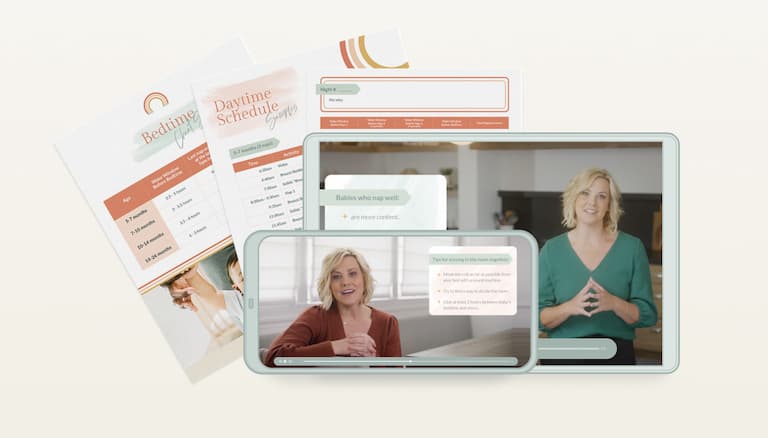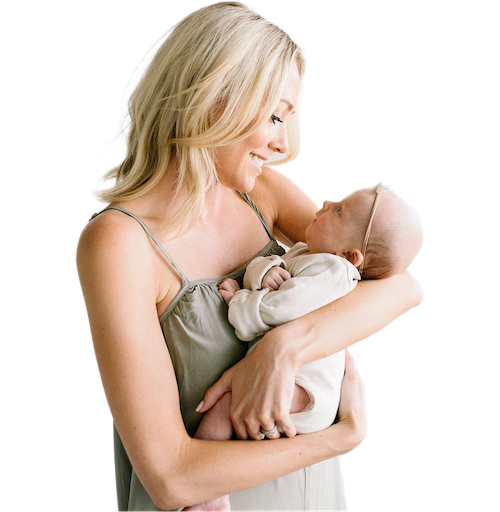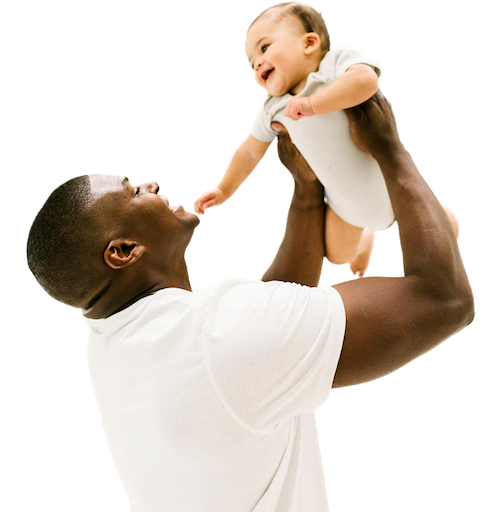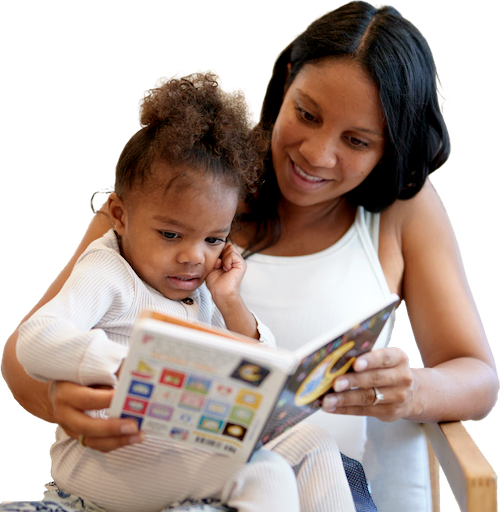At sixteen months your little one is making strides into toddlerhood! I’d love to share my most frequently asked questions about 16 month old sleep, including sleep schedules, nap schedules (one nap or two?), bedtime for a 16 month old, regressions, and more!

The 5–24 Month Collection
stars ( reviews)
Need a plan for sleep for your 16 month old? My 5-24 Month Collection will help! I’ll teach you a customizable, step-by-step plan to achieve independent sleep for nights and naps while remaining emotionally connected to your little one. I’ll guide you through how to handle development progressions, separation anxiety, nap transitions, and all the bumps along the way.
Learn MoreWhat are wake windows for a 16 month old? anchor
For a 16 month old, wake windows can range from 3-6 hours depending on your baby’s individual needs. There is a big range for wake windows at this age because some 16 month olds are taking one nap, some are transitioning to one nap, and some still take two naps.
Wake windows for a 16 month old taking two naps are typically 3-4 hours. Here’s a guide for a daily routine for a 16 month old taking two naps:
About 3 hours after Wake Time = Nap 1
About 3-3.5 hours after the end of Nap 1 = Nap 2
About 3.5-4 hours after the end of Nap 2 = Bedtime
If your 16 month old is taking one nap, wake windows are typically 4-6 hours. Here’s a guide for a daily routine for a 16 month old taking one nap:
About 5-6 hours after Wake Time = Nap
About 4-5 hours after the end of the Nap= Bedtime
16 Month Sleep Schedule Guidelinesanchor
Every little one is unique and your toddler’s day will depend on when they wake, how long they nap, and individual cues. Try aiming for these age-appropriate guidelines. These are not intended to be a rigid schedule, simply a guide for setting up a flexible routine.

Text version of Guidelines at 16 Months table
| Daytime Feedings: | 3 meals, snacks as needed |
|---|---|
| Goal Daytime Sleep: | 2-3 hours |
| Sweet Spot Bedtime: | 7:00-8:00 pm |
| Number of Naps: | 1-2 |
| Wake Windows: | |
| Goal for 2 naps: | 3-4 hours |
| Goal for 1 nap: | 4-6 hours |
For more details on these recommendations, keep reading.
What is a sample sleep schedule for a 16 month old? anchor
Here are two schedules for 16 month olds — one with 2 naps and one with 1 nap — to help you see how a day might play out. Keep in mind that these are simply examples and your days will vary based on your little one’s wake time, nap lengths, and wake windows.

Text version of 16 Month Old Sleep Schedule Two Naps table
| Time | Activity |
|---|---|
| 6:30 am | Wake |
| 7:00 am | Breakfast |
| 9:15 am | Snack/Nursing (optional) |
| 9:45 -10:45 am | Nap 1 |
| 11:30 am | Lunch |
| 2:00 pm | Snack/Nursing (optional) |
| 2:15 - 3:50 pm | Nap 2 |
| 4:15 pm | Snack/Nursing (optional) |
| 6:30 pm | Dinner |
| 7:30 pm | Snack/Nursing (optional) |
| 7:50 pm | Bedtime |
16 Month Old Sleep Schedule with One Nap:
This is an example of a 16 month old sleep schedule for a baby who has transitioned to one nap. Please remember, your baby’s wake time, nap length, and individual caloric needs will impact what each day looks like.

Text version of 16 Month Old Sleep Schedule One Nap table
| Time | Activity |
|---|---|
| 6:45 am | Wake |
| 7:15 am | Breakfast |
| 9:30 am | Snack/Nursing (optional) |
| 11:30 am | Lunch |
| 12:00 - 2:45 pm | Nap |
| 3:00 pm | Snack/Nursing (optional) |
| 6:00 pm | Dinner |
| 7:00 pm | Bedtime |
How long should a 16 month old nap? anchor
The goal for total daytime sleep for a 16 month old is 2-3 hours. We are still aiming for 2-3 hours of total daytime sleep whether they’re taking one nap or two naps each day.
Here’s what that looks depending on the number of naps your baby needs:
16 Month Old Sleep Schedule with Two Naps: Dividing our goal of 2-3 hours of daytime sleep between two naps can look different from one little one to another at this age. There’s not one “right” way to do it; it simply depends on what works for your baby. For some 16 month olds, a 2 hour nap and a 30-45 minute nap is great. For others, two naps of 1.5 hours each works best. When taking two naps at 16 months, we do want at least one of those naps to be an hour or longer (This ensures we’re getting restorative sleep.). We also want to avoid any single nap lasting longer than two hours. This allows for enough active awake time to protect night sleep and keeps bedtime between 7:00-8:00 pm.
16 Month Old Sleep Schedule with One Nap: When your 16 month old is ready for one nap, all of their daytime sleep is consolidated into one 2-3 hour nap. I do encourage capping the nap at 3 hours to preserve nighttime sleep and maintain a bedtime between 7:00-8:00 pm.
If nights are going well, but your 16 month old is struggling to get 2-3 hours of daytime sleep, my Conquering Naps class can help. I’ll teach you how to achieve solid naps and help your little one get the restorative daytime sleep they need.
How many naps should a 16 month old take?anchor
This depends on the 16 month old! Some need two naps per day, while others do well with one nap.
If you’re wondering if your 16 month old is ready to transition to one nap, here are the signs:
Waking during the night when nights were going well before
Falling asleep is taking longer than 20 minutes
Taking short naps
Protesting or refusing naps
Waking earlier than 6:00 am when this hasn’t recently been an issue
Dropping down to one nap is much easier when your baby is truly ready. I like to see little ones showing signs of readiness for about 1-2 weeks before making the transition to one nap.
Please know that this is a big transition! It can take 2-4 weeks until your baby is consistently taking one consolidated nap. In order to move to one nap, your baby will need to stay awake for about 5-6 hours before the nap without becoming overtired. Many 16 month olds can handle this wake window without any issue, but it is a struggle for some.
If you need more help, my Conquering Naps class can walk you through this nap transition and help you have a great little napper.
What time should a 16 month old go to bed?anchor
Bedtime for a 16 month old is ideally between 7:00-8:00 pm. This is typically the “sweet spot,” as bedtime in this range helps babies fall asleep and stay asleep during the night. Having a predictable bedtime routine is also a key part of bedtime success.
I understand that for some families, bedtime needs to be outside of this range. If bedtime for your 16 month old is before 7:00 pm or after 8:00 pm and sleep is going well, that’s great! You don’t need to worry about making any changes.
If your 16 month old is going to bed later than 8:00 pm and is struggling to fall asleep at bedtime, having false start bedtimes, waking in the middle of the night, or waking before 6:00 am, try moving bedtime a little earlier for a couple of weeks to see if it helps.
Shifting bedtime earlier (Think 6:00-6:30 pm.) can be helpful for nighttime sleep when daytime sleep didn’t go as planned. Consider moving bedtime earlier than 7:00 pm if:
A nap was refused or short
Daytime sleep was less than 2-2.5 hours total.
Your 16 month old has been awake about 4 hours and is really having a hard time making it to bedtime, especially if they've recently transitioned to 1 nap or they’re sick.
What are some 16 month old milestones?anchor
When your toddler is 16 months old, they may:
Say more words (Babies are typically saying at least 10 words by 18 months.)
Be more confident with walking and even start to run and climb.
Dance when music is played.
Use more nonverbal communication to tell you what they want or need, like pointing or bringing you something if they need help.
Show frustration when told no or not given the opportunity to do something by themselves.
Use a cup independently and be more confident with utensils.
Expert Tip: At this age, little ones typically understand more language than they can express. As they’re craving more independence, now is a great time to offer some choices throughout the day when you can.
Each new milestone your little one achieves is so exciting, but please know these milestones are based on age ranges and every child develops at their own pace. Please be sure to speak with your pediatrician if you have any questions or concerns about your 16 month old’s development.
What are some activities I can do with my 16 month old? anchor
Your 16 month old is learning from you everyday! They’re wanting a bit more independence, but still need close supervision. Here are some activities to try with your 16 month old:
Practice throwing or rolling a soft ball. You can make this a sensory activity by making balls out of tissue paper and tossing them in a laundry basket. Your little one might also like to get in the basket like a ball pit!
Invite them to help you with laundry. Show them how to put clothes in the dryer and give them the opportunity to imitate you. You may be surprised how exciting laundry can be for your toddler!
Build a fort! Set up some chairs and throw a big blanket over them. Read together in the fort, use a flashlight, or bring some toys in!
Try some pretend play! Set up a little tea party. “Cook” together using items from the kitchen or a cooking set.
I have some favorite toys for your 16 month old here.
Safety Tip: It’s a great time to check around your house for any new safety concerns as your toddler is starting to reach and open things they may not have been able to before. Be sure furniture is anchored and door knobs are child proofed. I have some of my favorite baby proofing products here.
Can I give my 16 month old a blanket for sleep? anchor
You can. According to the American Academy of Pediatrics, blankets are safe and acceptable after your child’s first birthday. However, I do typically recommend a sleep sack instead of a blanket for little ones still sleeping in a crib. At this age, they’re still so active in their sleep. This makes a sleep sack much more effective for keeping your 16 month old warm because it will stay on all night.
While I still love wearable blankets over loose blankets for warmth, this can be a perfect age to introduce a small blanket or lovey as a comfort item.
Here are some tips for choosing a blanket or a lovey for your 16 month old:
Soft: You don’t want your child hurting themselves when rolling on it at night.
Free of loose parts and choking hazards: No button eyes or removable parts.
An appropriate size: Think small enough to pick up and hold independently, but big enough to snuggle.
Expert Tip: I recommend having 1 (or 2 or 3) identical backup comfort objects in case the current blanket or lovey needs a bath or gets misplaced. Alternate between them so they look and feel the same.
Please check with your pediatrician if you have any concerns about introducing a blanket or a lovey.
Is there a 16 month sleep regression? anchor
It’s possible! Some families do see a sleep regression around 14-16 months. Here are some other reasons you may be seeing changes in your 16 month old’s sleep:
Wake windows need adjusting.
A nap needs to be dropped.
New teeth are popping up (You may notice your baby is cutting their first year molars.).
The good news is sleep regressions are temporary! While they typically last for a week or so, please know, the best way to move through a sleep regression with minimal disruptions is to be consistent with your approach to sleep.
Why does my 16 month old constantly wake up at night?anchor
If waking during the night is a sudden change for your 16 month old, please check to make sure they’re not experiencing any physical discomfort (think illness or teething).
If your 16 month old continues to wake up at night, and you know they know they are comfortable and healthy, consider these possibilities:
Your baby is not tired enough. If your baby is on the lower end of the age-appropriate wake window range, slowly add more time to each wake window. Think 10-15 minutes every few days. This gradual shift will help you find the range that works best for your little one without causing overtiredness.
Your baby’s body needs more active awake time. The increasing mobility and desire for independence at this age often mean needing more active awake time. Have a dance party or get outside for a bit to help get that physical activity necessary for great nights and naps.
Your baby is overtired. If your 16 month old recently transitioned to one nap or wake windows were increased, try slightly decreasing wake windows. Being overtired makes it hard for little ones to fall asleep and stay asleep.
Your baby is ready to transition to one nap. If your 16 month old is taking two naps, this may be the time to drop a nap.
Your baby is experiencing a peak of separation anxiety. At this age, this might look like crying when entering their room, standing in the crib in protest, or showing strong preference for one caregiver at bedtime. Offer validation, practice short periods of intentional separation, and play games like Peek-a-Boo to help ease separation around sleep times.
Your baby is learning new skills. The more opportunity your little one has to practice these new skills during awake time, the less exciting those skills seem when it’s time for sleep.
Your baby’s sleep environment needs adjusting. Making the room really dark (use code Cara for 10% off) and using a sound machine (use code CARA20 for 20%) minimizes any stimulating light or noise. Check the room temperature and how your baby is dressed for sleep, especially as seasons change. A comfortable environment is key to sleep success.
If your 16 month old has been struggling with sleep for awhile, my 5-24 Month Collection will give you a step-by-step plan to restful nights in the crib (10-12 consolidated hours!). I'll teach you everything you need to know to have a great little sleeper, while remaining emotionally present and connected every step along the way.
Can I sleep train my 16 month old? anchor
Yes, you can! It’s not too late to have a great little sleeper.
If you’re wondering if sleep training is the best option for your family, I’d love to share my own experience and the research about sleep training with you. If you’re ready to start sleep training for your 16 month old, the 5–24 Month Collection is a holistic plan that is fully-customizable to meet your family’s goals. I’ll give you a step-by-step plan for consolidated nights, solid naps, and all the bumps along the way while remaining emotionally connected through the whole process.
Still have a 15 month old? Check out 15 month sleep schedules. Already have a 17 month old? I've got you covered with my 17 month sleep schedules.
References
4 Sources
Mindell et. al. (2008). Developmental aspects of sleep hygiene: Findings from the 2004 National Sleep Foundation Sleep in America Poll
Mindell and Williamson. (2017). Benefits of a bedtime routine in young children: Sleep, development, and beyond
Paruthi et. al. (2016). Recommended Amount of Sleep for Pediatric Populations: A Consensus Statement of the American Academy of Sleep Medicine
Tham, Schneider, and Broekman. (2017). Infant sleep and its relation with cognition and growth: a narrative review
Keep in mind that the information and content on this blog is for informational purposes and should not be considered medical advice. If you have questions about your child, please reach out to your doctor.








